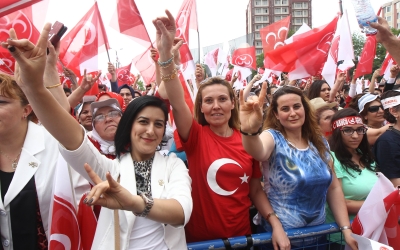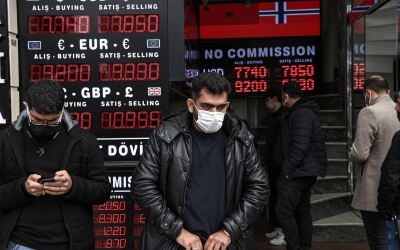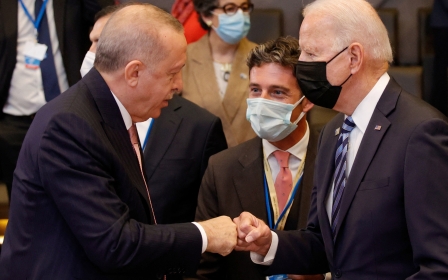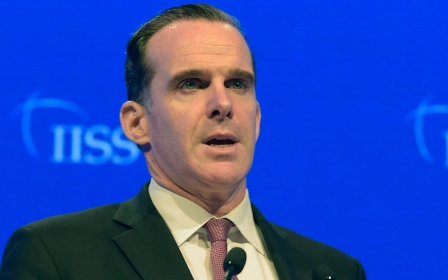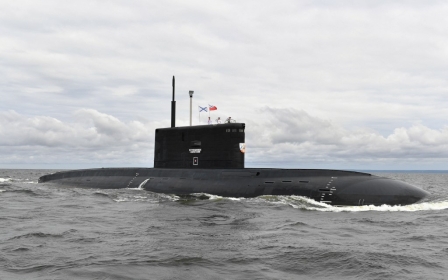Grey Wolves: Amendment to US defence bill has Turkey's ultra-nationalists in its sights
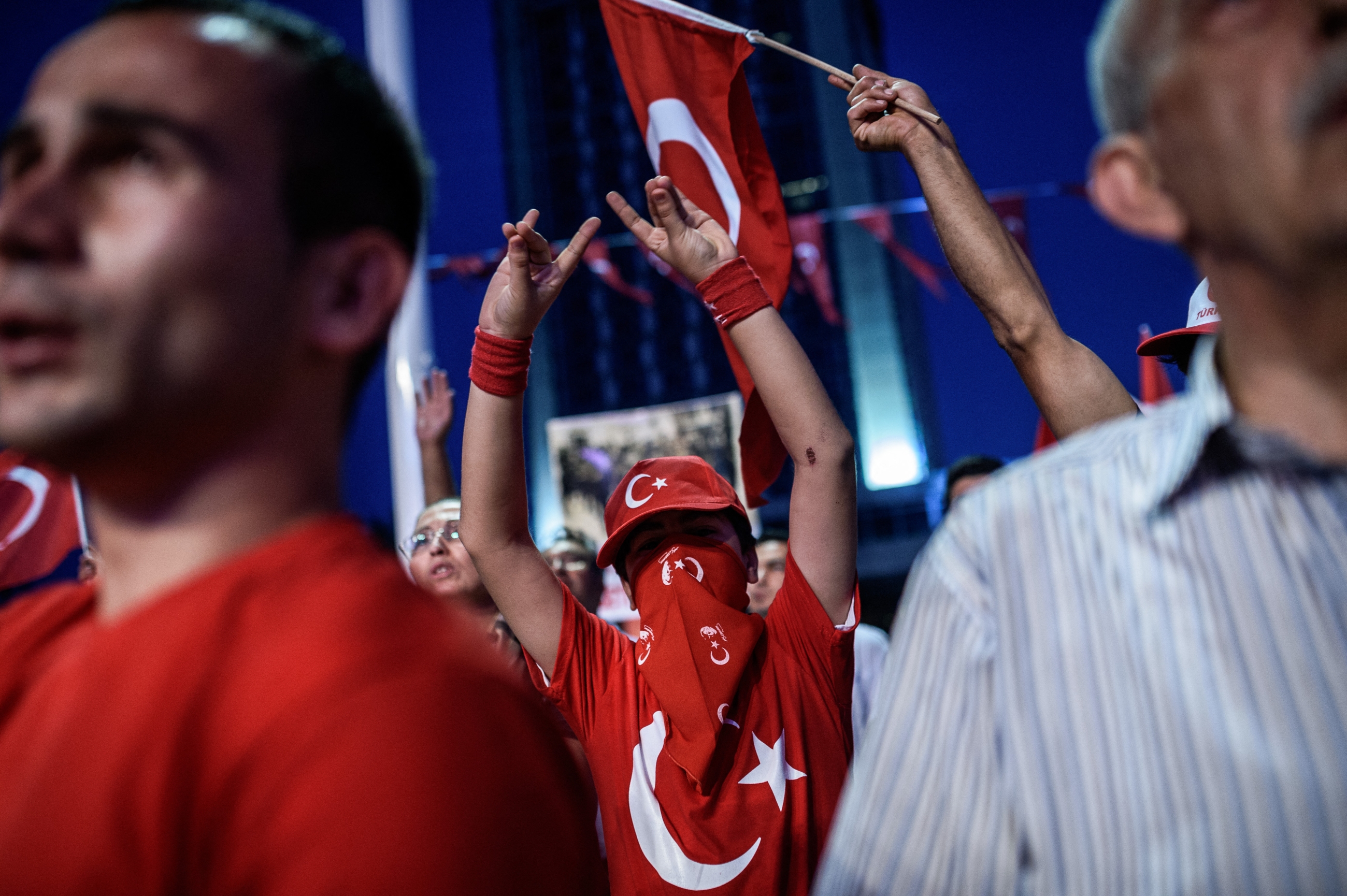
Tensions between Turkey and the US have found their way into a mammoth defence spending bill in Washington, with lawmakers proposing legislation that looks to determine whether an ultra-nationalist group with links to the Turkish government should be designated a Foreign Terrorist Organization.
The National Defense Authorization Act (NDAA), which passed the House last month and is currently awaiting a vote in the Senate, includes an amendment that would require the State Department to investigate the Grey Wolves, a Turkish ultra-nationalist group with links to a political party allied with President Recep Tayyip Erdogan.
The text of the amendment asks the US Secretary of State to provide “a detailed report of the activities of the Grey Wolves organization undertaken against US interests, allies, and international partners”.
Following the investigation, it requests a determination be made as to whether “the Grey Wolves meet the criteria for designation as a foreign terrorist organization”, and, if not, for Congress to be provided with a “detailed justification as to which criteria have not been met”.
'Touched a nerve in Ankara'
New MEE newsletter: Jerusalem Dispatch
Sign up to get the latest insights and analysis on Israel-Palestine, alongside Turkey Unpacked and other MEE newsletters
The Grey Wolves are a youth branch of the Nationalist Movement Party (MHP), a coalition partner in Erdogan's government.
Some have said the Grey Wolves serve as a tool to advance Ankara's foreign policy in regional hotspots like Cyprus, Syria and Nagorno-Karabakh, a territory disputed by Armenia and Azerbaijan, while its string of affiliated offices across Europe has also drawn the attention of EU politicians concerned that Turkey uses the group to wield influence over its large diaspora.
Last year, the group was banned in France after a memorial to the mass killings of Armenians in World War One was defaced with graffiti, including the name of the Grey Wolves and letters RTE, a reference to Erdogan.
EU lawmakers have accused the group of engaging in “destabilising measures and sedition on European soil”, and in May the European Union’s parliament called for the EU to "examine the possibility" of adding the Grey Wolves to its terrorist list.
A spokesperson for Democratic Congresswoman Dina Titus, who sponsored the amendment in the House, told Middle East Eye that following the EU measures “it [is] pertinent that the US Department of State conduct its own review to ensure that any threat posed by this group is properly identified by the United States and that appropriate measures are put in place to account for potential risks”.
Turkey’s Foreign Ministry has slammed the amendment as an “imprudent request", with spokesperson Tanju Bilgiç stating, "It is extremely saddening and worrying that such a request, which has unfounded accusations and does not fit our deep-rooted alliance with the United States, has even been approved by one wing of the US Congress.”
A congressional source with knowledge of the amendment told MEE on condition of anonymity that on Capitol Hill it appeared lawmakers had “touched a nerve” in Ankara, adding “the MHP is disgruntled by this. There has been a robust reaction.”
'Turkey cannot turn a blind eye'
When Erdogan came to power in Turkey in 2003 he ran on a moderate Islamic platform and the secular MHP was seen as an unlikely partner in a country where nationalists and Islamists have often been at odds. But over the past few years, as Erdogan and his ruling Justice and Development party's (AKP) poll numbers have faltered they have built a political alliance with the MHP.
The MHP has staunchly supported, and some say shaped, much of Turkey’s muscular foreign policy, such as military campaigns against Kurdish forces in Iraq and Syria, promoting an independent Turkish State in Northern Cyprus, and aiding Turkic Azerbaijan in its conflict with Armenia last year.
Ozgur Unluhisarcikli, director of the German Marshall Fund of the United States's office in Ankara, told MEE that political dynamics in Turkey make it hard for Erdogan to brush off the proposed amendment.
“The Grey Wolves is an organisation that is directly affiliated with the Nationalist Movement Party, which is President Erdogan’s alliance partner. Therefore, the Turkish government cannot turn a blind eye to this development,” Unluhisarcikli said.
The MHP’s growing influence in Ankara has coincided with a fraying of ties between Washington and its Nato ally, with US lawmakers increasingly concerned about the direction of Turkish policy.
Last month, Erdogan said that Turkey plans to go ahead with the second order of Russian S-400 missile defence systems, in a move that may trigger fresh US sanctions. Turkey is already under sanctions for its first purchase of the Russian defence system, and has been suspended from Washington’s F-35 fighter jet programme over concerns that the S-400 left sensitive technologies vulnerable to spying by Moscow.
Speaking on the sidelines of the UN General Assembly last month, Erdogan decried the state of relations between Turkey and the US, saying that Washington needed to “sort out” issues with his country, and adding that he and President Joe Biden had not “started off right”.
Unluhisarcikli told MEE: “The US-Turkey relationship, which used to be characterised as a strategic partnership, is little more than transactional cooperation today.”
Besides the S-400, tensions have also flared over the Eastern Mediterranean crisis and the continued presence of Turkish troops in conflicts such as Syria and Libya. For its part, Turkey is upset over Washington's continued support for the Kurdish YPG militias in Syria, which Ankara considers a terrorist group.
The 'worst step to take'
The congressional source said that while Ankara has criticised the amendment, it met little resistance on Capitol Hill, as “it wasn’t seen as controversial in the House at all”.
Asked whether they believed it would be included in the final legislation agreed on by the House and Senate, the source said: “The amendment sailed through [the House] without opposition, so I don’t see why it would be stripped out in the Senate.”
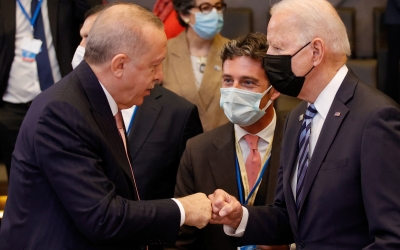
If the State Department does designate the Grey Wolves a Foreign Terrorist Organization it would likely have serious ramifications for the group and anyone associated with it - penalties would likely include the freezing of funds held in US bank accounts and losing access to the international financial system.
Murat Aslan, an analyst at the Ankara-based Seta think-tank close to the ruling AKP, called the proposed amendment “ridiculous” in a phone interview with MEE.
“There is a great prejudice to the Erdogan government in the US Congress no matter what the topic, and this clearly demonstrates it."
Aslan claims the Grey Wolves is simply a youth movement seeking to foster patriotism, and that its offices around Turkey provide educational and financial support for young people. Aslan warned that the amendment risked further straining ties between the Nato allies: “This is the worst step to take in managing the relationship between the two countries."
Middle East Eye delivers independent and unrivalled coverage and analysis of the Middle East, North Africa and beyond. To learn more about republishing this content and the associated fees, please fill out this form. More about MEE can be found here.


